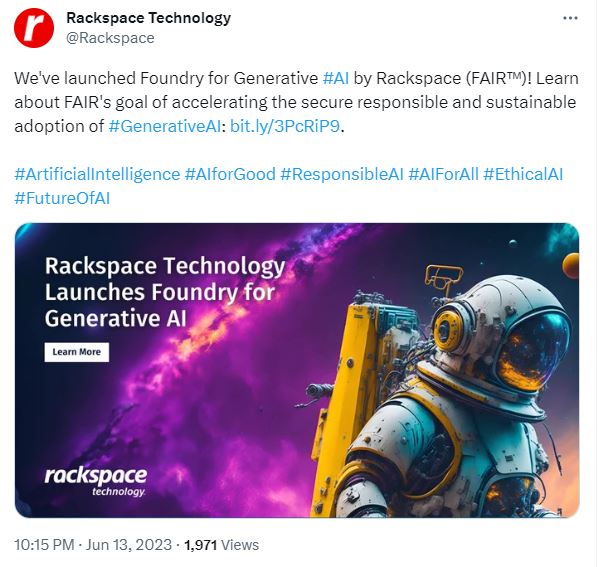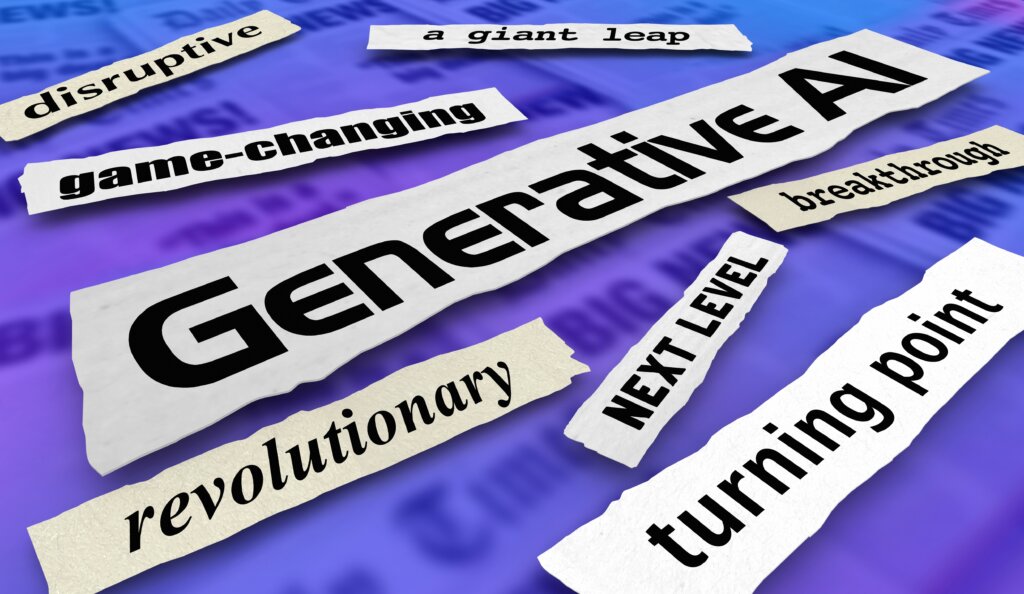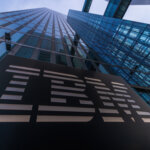
Rackspace Technology wants to help businesses ideate generative AI use cases. (Image – Shutterstock)
Generative AI influencing business strategies
Technology plays an important role in business strategies today. Most organizations want to make sure they are making the right decisions when planning their business strategies, be it for current productivity, workforce or future developments.
While business strategies are being influenced by data-driven insights, there is still the need to understand the choices at hand when making a decision, especially if it involves a huge sum of investment.
According to a report by Gartner, worldwide IT spending is projected to total US$4.7 trillion in 2023, an increase of 4.3% from 2022. As businesses continue to lose the competition for IT talent, they are shifting business strategies and spending to technologies that enable automation and efficiency to drive growth at scale with fewer employees.
Gartner also stated that the software segment will see double-digit growth in 2023 as organizations increase utilization and reallocate spending to core applications and platforms that support efficiency gains, such as enterprise resource planning (ERP) and customer relationship management (CRM) applications.
In fact, a survey by Rackspace Technology found that a growing number of global organizations – 69% (61% for APJ)– rank artificial intelligence and machine learning (AI/ML) as a high priority for their business strategies. Though most respondents said AI/ML is a high priority, only 41% (43% in APJ) say they have realized substantial benefits. AI use cases, projects, and investments will continue to grow across multiple industries (retail, finance and healthcare, etc) as companies look to maximize resources and optimize operations in the cloud.
As a leading multi-cloud provider, Rackspace Technology has been helping companies to reap the benefits of Generative AI in the public cloud. The tech company recently unveiled Foundry for Generative AI by Rackspace (FAIR). FAIR is a groundbreaking global practice dedicated to accelerating the secure, responsible and sustainable adoption of generative AI solutions across industries.

Foundry for Generative AI by Rackspace (FAIR™) by Rackspace Technology.
Generative AI for businesses
In a conversation with Tech Wire Asia, Dharmendra (DK) Sinha, President of Public Cloud Business Unit at Rackspace Technology said there are now more real use cases of generative AI being adopted across verticals. Generative AI can be used for efficiency, improve time-to-market productivity and enhance business outcomes, among many other things.
Sinha pointed out that there are two aspects of generative AI for businesses. First, organizations can look at how generative AI can be applied by touching core applications. For example, using generative AI for policy administration at an insurance company. The technology can be used to build a use case around it and provide huge business outcomes.
Sinha thinks customers are starting to look at where the use cases are right now – touching the core of the business. They want to make sure that this is established, and proven responsible before they start to replicate it across the business. A lot of use cases we see happening in the industry right now are around under-invested functions like finance, human resources, travel, learning, etc.

Dharmendra (DK) Sinha, President of Public Cloud Business Unit at Rackspace Technology
“If you can have a good use case, you can deliver significant efficiency, savings, cost takeout, and such. These are not mission-critical per se. For example. If the IT helpdesk response goes down by 30 seconds, the world is not going to come crashing. It’s an easy use case customers are looking at and we have seen tremendous traction across all industries across most of these underinvested functions,” explained Sinha.
Secondly, when it comes to core functions, there are industries that have started to see good traction. This includes retail, healthcare, manufacturing, and such. Some of these industries have taken the lead in getting generative AI applied to their core functions as well.
“The good news is that these are not very long drawn expensive projects. These are quick projects, with good returns highly visible. We’ve started to see our clients experiment with us and with other providers in generative AI. We have over 500 use cases within Rackspace as far as generative AI is concerned,” added Sinha.
This is where FAIR fits in as well. FAIR aims to be a force multiplier to accelerate the pragmatic and secure use-case-based adoption of generative AI in businesses across all industries. It builds on unique Rackspace Technology IP and multi-cloud capabilities along with its global footprint to facilitate:
- Cutting-edge AI/ML, analytics, data services, and assets gained through the strategic acquisition of Just Analytics.
- Industry-leading partnerships, with leading hyperscalers, including the extended ecosystem of open-source AI solutions featuring Hugging Face and stability.ai, to drive rapid Open Innovation.
- The development of AI Private Cloud capabilities, including GPU-based high-performance computing, low latency storage solutions such as Rackspace Data Freedom, and secure networking across 30 plus global data centers, to enable the data kinetics needed to build advanced AI models in a private, secure, and on-demand environment.
Generative AI use cases to improve business strategies
One of the common problems most businesses face whenever a new technology is released is understanding how it can work best to improve their business. With generative AI seemingly a key technology influencing business strategies, understanding the many use cases that it is available to work is essential for organizations.
Fortunately, there are plenty of use cases for generative AI, as pointed out by Shwetank Sheel, Director of Global Data Presales and Solutions at Rackspace Technology. Sheel highlights two examples in which Rackspace Technology is working with.

Shwetank Sheel, Director of Global Data Presales and Solutions at Rackspace Technology
The first example is a Singaporean ISP company who are building software. Instead of having an application where users go in and search text queries, find relationships, download and read, Rackspace Technology is helping them build out a knowledge graph using large language models (LLM) and base foundation models and embedding them into their application.
“The users are now going to be able to do both their online and offline research workflows. They can understand what the implications are of collecting this combination of fields from a data privacy perspective, instead of going and reading several different sort of policy documents. They can actually ask and get a response,” said Sheel.
The second use case example is in the retail B2B space whereby companies want to reduce the friction that it takes for customers to engage, both to identify as well as engage in purchasing and recommending certain kinds of consumer products. In the past, it would have been sort of a regular interface whereby a user selects a product with an ML model, which tells them these are things that are related. Instead of that, with generative AI, a user can go in and prompt a scenario like they are going to an evening event, which outfits and accessories would suit them best, etc. There is a shift to a person-based conversational identification of cross-sell and upsell, rather than a typical “Add to Cart” and identify differences.
“In Singapore itself, we’re obviously seeing a lot across many industries. On the internal side, the management tends to be focused on a large productivity increase. On the B2C side of things, it really excites and changes the mechanics, in which, customers engage with us,” he added.

Generative AI use cases are increasing for businesses. But which works best for them? (Image – Shutterstock)
Starting with generative AI
For business strategies that involve the use of generative AI, Sheel also mentioned that Rackspace Technology goes through the process of identifying what is the business KPI that needs to be affected. In the examples mentioned earlier, one of the business KPI use cases was conversion and the percentage of interactions resulted in a flow-through, either in a single or multi-attribution conversion to a sale.
For this, there is some aspect of generative AI in terms of how the interactions happen. This includes some aspects of general analytics in terms of identifying similar products. There is also the need to consider the governance and bias that has to go in. Rackspace Technology needs to ensure the generative AI is not recommending things to users just because of their gender, or because of how they’re interacting.
“What we’re seeing is that businesses need to come at it from the actual business KPI or the ideation about what they need to do. From there, they can look at what role generative AI or machine learning plays and what role the underlying platform play. I think one of the unique differentiators that Rackspace Technology brings in is that we’re not only coming from the analytics perspective, but we’ve got the platform and security perspective, which is one of the key things that we always see customers ask about,” he said.
As Sinha clearly indicates as well, the underlying data is extremely important for any of these projects. And this is where Rackspace Technology’s core strength is as well.
“Given the demand for generative AI today, we feel that we need to be part of this amazing market. Generative AI will eventually become the general DNA of any company. We want to engage with our clients to help them ideate first, like what are some of the business strategies and cases that can pick up the business KPIs impact. We want to help them pick the best area that generative AI can impact on – be it efficiency, cost savings, or whichever is right.” Concluded Sinha.
In the second part of the conversation, Tech Wire Asia takes a deeper dive into FAIR, as well as how businesses can deal with the complexities when working with generative AI use cases in the cloud.
READ MORE
- Enhancing Business Agility with SASE: Insights for CIOs in APAC
- 3 Steps to Successfully Automate Copilot for Microsoft 365 Implementation
- Trustworthy AI – the Promise of Enterprise-Friendly Generative Machine Learning with Dell and NVIDIA
- Strategies for Democratizing GenAI
- The criticality of endpoint management in cybersecurity and operations




